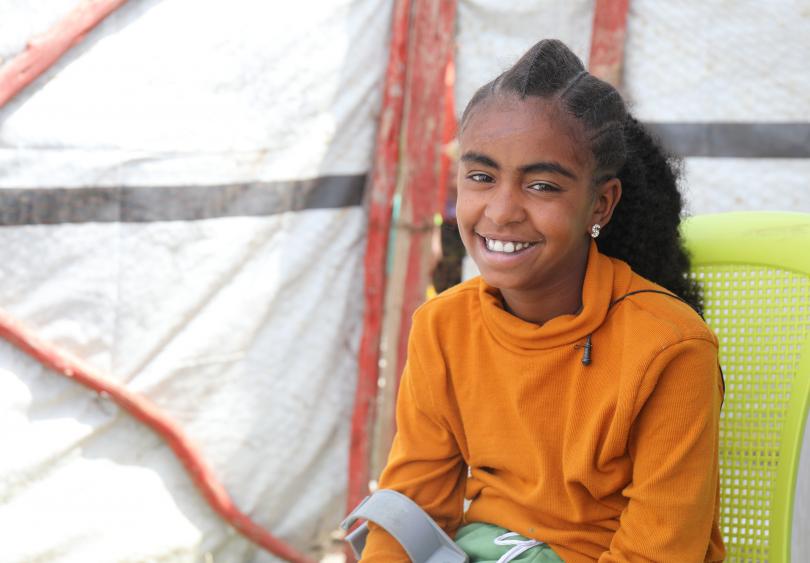Whispers of Hope: Freweyni’s Unbreakable Spirit

Story summary
Freweyni*, 11, used to live with her family (aunt, mother and two sisters) in Raya Mayichew Tigray region. She was a grade 3 student when the Northern conflict broke out. It was in 2020 during the first-round conflict their house was hit by a heavy artillery in the broad daylight. Immediately after the shieling, Freweyni lost her younger sister, and her grandfather was hit on the head while she was severely wounded on many parts of her body. The rest of the family moved to Mekele 70 Kare IDP camp while Freweyni stayed in Ayder Hospital for medical treatment.
Now Freweyni is attending grade one class, two grades back because of her memory loss due to the accident and missing classes for over three years. Though years passed, Freweyni is still following medical care with rounds of surgeries on her leg and stomach. She was full of laughter when we met her in Mekele 70 Kare IDP camp playing in the Children Friendly Space, which Save the Children built 3 years before. The happy, and innocent smiles on her face hide any hint of the deep pain and anguish that ruined her play-filled, innocent childhood.
Freweyni's favorite food is a burger, and she wishes to be a teacher when she grows up. She loves playing volleyball in the center where she feels safe and protected. She is admired and loved by her teachers for her active participation in the classrooms though she could not move to the next grade due to the round of surgeries that forced her to miss school in recent months.

Freweyni's story in her own words (Quotes)
"My family lives in a canvas shelter that is unable to keep out the intense cold in the area. I even tried calling my father, who split up with my mother and left before the conflict broke out, to ask him to take me somewhere else, but he never answered."
"Most of the time my mother goes to churches, taking my grandfather to "Tsebel" (holy water treatment) to receive spiritual healing for the mental instability she experienced following the accident that put a terrible head injury on her."
"I recently had a chance to fly to Addis Ababa to take part in 3+ million campaign which was organized by Save the Children (This is a child led campaign that advocates for the rights of children affected by war and missed out on education). On the event, after having the chance to speak with a cowed about my feelings, I became overjoyed with the idea that there is a better world outside of the IDP camp, where I could be valued and heard."
" I want to live in a better place where I and my family feels comfortable not in the chilly, windy Canva shelter."
Background / Project information
Save the Children has been working to provide kindergartens and different schools in the Tigray region that have been impacted by conflict with a variety of resources. It also supports the regional government efforts to resume regular teaching and learning processes for the millions of children who left their beloved classrooms due to conflict.
With two distinct initiatives, Save the Children introduced emergency education. The first project is called "0-class" early childhood education and utilizes a play-based approach to provide psychological assistance for traumatized children via arts and crafts and other practices. For the past three years, this project has been running continuously in the "Adigrat IDP camp" centers, where over 250 students spend their daily time, and the "Mekele 70 Kare" child-friendly space. The second project involves providing 1st cycle primary school service and inclusive education to internally displaced people (IDP) children in Adwa Kindergarten, Mekele 70 Kare, and Shire. It is grade-based and offers formal curriculum-based instruction.
With financial assistance from Finland Project, Save the Children is currently determined to provide emergency education in the IDP centers established in Tigray region. During the 2023 financial year, Save the Children provided various supports, such as provision of learning materials to IDP centers and supply of energy biscuits to students, for about 69,615 children, of which 470 had different physical disabilities.




